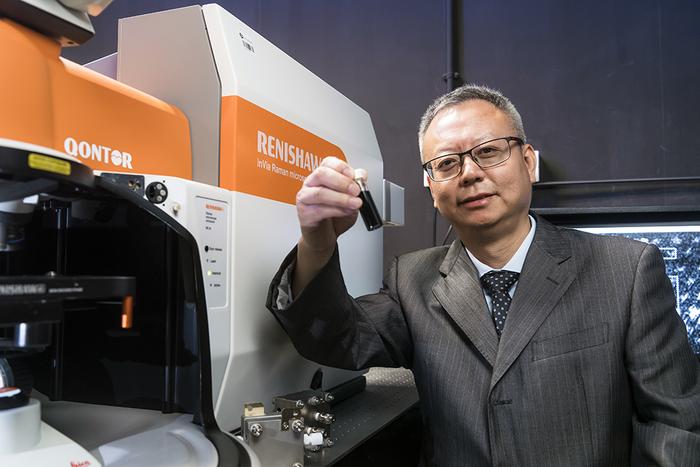A research team led by City University of Hong Kong (CityU) has achieved a groundbreaking advancement in nanomaterials by successfully developing a highly efficient electrocatalyst which can enhance the generation of hydrogen significantly through electrochemical water splitting.

Credit: City University of Hong Kong
A research team led by City University of Hong Kong (CityU) has achieved a groundbreaking advancement in nanomaterials by successfully developing a highly efficient electrocatalyst which can enhance the generation of hydrogen significantly through electrochemical water splitting.
This major breakthrough has great application potential for the clean energy industry.
Professor Zhang Hua, Herman Hu Chair Professor of Nanomaterials at CityU, and his team have developed an electrocatalyst by using the transition-metal dichalcogenide (TMD) nanosheets with unconventional crystal phases as supports. The electrocatalyst exhibits superior activity and excellent stability in electrocatalytic hydrogen evolution reaction in acidic media.
“Our research finding is significant in the sense that the hydrogen generated by electrochemical water splitting is regarded as one of the most promising clean energies to replace fossil fuels in the near future, reducing environmental pollution and the greenhouse effect,” said Professor Zhang.
This important finding has been published in the prestigious journal Nature with the title of “Phase-dependent growth of Pt on MoS2 for highly efficient H2 evolution”.
Professor Zhang said the key to the research on electrocatalytic water splitting is to develop highly efficient and stable catalysts. It is of great significance to choose a suitable support to improve the activity and stability of catalysts during the process.
As an emerging two-dimensional (2D) material, TMD nanosheets have been of great interest among researchers because of their unique physical and chemical properties. It has been found that phase is an extremely important factor that determines the properties and functions of TMD nanosheets. For example, molybdenum disulfide (MoS2) with the conventional 2H phase exhibits a semiconductor property, while MoS2 with unconventional 1T or 1T′ phase shows metallic or semi-metallic property, thus possessing good conductivity. However, the production of unconventional-phase TMD nanosheets with high phase-purity and high quality remains challenging. The research on the effect of the TMD crystal phase on the growth of other materials is still at an early stage.
In recent years, Professor Zhang’s research team has developed a number of new methods, such as solid-gas reactions and salt-assisted synthesis, and has successfully prepared a number of high phase-purity and high-quality TMD crystal materials with unconventional 1T′ phase. Owing to their unique semi-metallic properties, these nanomaterials have great potential in applications in the fields of optoelectronic devices, catalysis, energy storage and superconductivity.
In this research, the team successfully developed a new method to prepare TMD nanosheets with unconventional phases. They also investigated the crystal phase-dependent growth of noble metals on 1T′-TMD and 2H-TMD nanosheets. They found that using the conventional 2H-TMD as a template, it facilitates the epitaxial growth of platinum (Pt) nanoparticles, whereas the unconventional 1T′-TMD template supports single-atomically dispersed Pt atoms (s-Pt). Based on these findings, the team developed the single-atomically dispersed Pt atoms/1T′ phase molybdenum disulfide (s-Pt/1T′-MoS2) catalyst.
To overcome the mass transport limitation of Pt-based catalysts in electrocatalytic hydrogen evolution reactions in acid media, the team adopted an advanced floating electrode technology for testing. Their experimental results found that the s-Pt/1T′-MoS2 catalyst exhibited a high mass activity of 85±23 A mgPt-1 at an overpotential of −50 mV and a mass-normalized exchange current density (127 A mgPt-1). Besides, the catalyst can work stably for 500 hours in a proton exchange membrane water electrolyser, showing promising application potential.
The team systematically investigated the phase-dependent growth of noble metals on 1T′-TMD and 2H-TMD nanosheets, and demonstrated that 1T′-TMD nanosheets can be effective supports for catalysts.
“The synthesized new electrocatalyst exhibits superior activity and excellent stability in electrocatalytic hydrogen evolution reaction in acidic media, and it will play an extremely important role in the development of clean energy in the future,” said Dr Shi Zhenyu, postdoc at the Department of Chemistry and the first author of the paper.
The findings have expanded the scope of “Phase Engineering of Nanomaterials” (PEN), paving a new way for the design and synthesis of highly efficient catalysts. Professor Zhang said that in the future, the team will continue the research on 1T′-TMD-based catalyst and its prospects in industrial application, in order to contribute to clean energy and sustainable development.
The corresponding authors are Professor Zhang and Professor Anthony R. J. Kucernak from the Department of Chemistry, Imperial College London. This research project brought together collaborators from universities and research institutes in Hong Kong, mainland China, Singapore and the UK, showing the importance of international collaboration in achieving scientific breakthroughs.
Journal
Nature
DOI
10.1038/s41586-023-06339-3
Method of Research
Experimental study
Subject of Research
Not applicable
Article Title
Phase-dependent growth of Pt on MoS2 for highly efficient H2 evolution
Article Publication Date
13-Sep-2023




